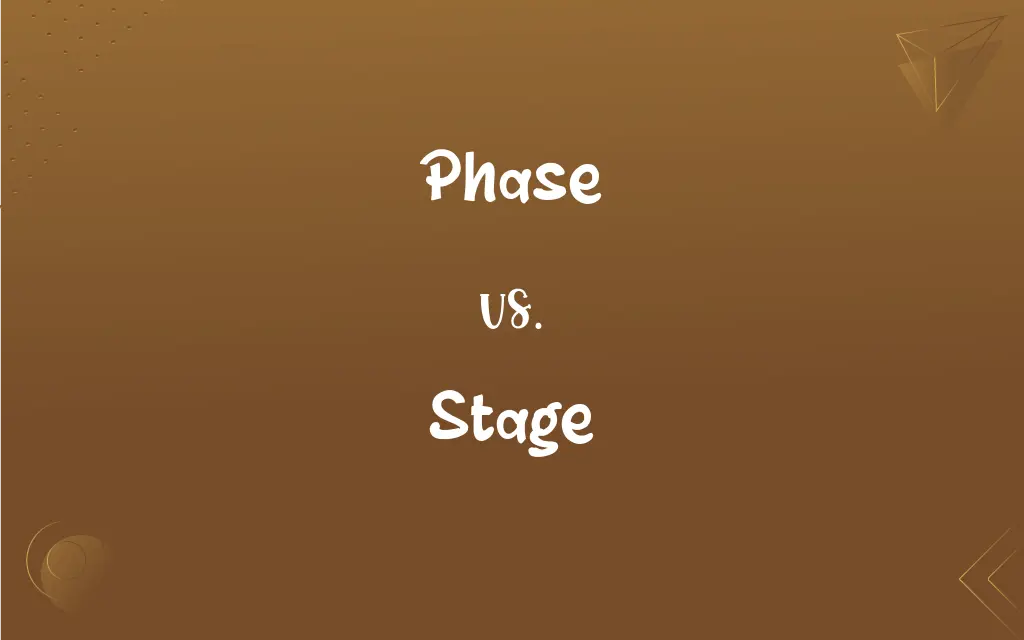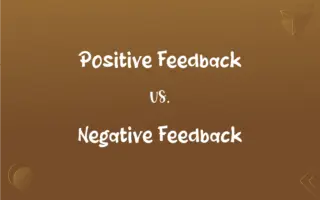Phase vs. Stage: What's the Difference?
Edited by Aimie Carlson || By Harlon Moss || Published on January 3, 2024
"Phase" is a distinct period in a process of change or development, while "stage" refers to a specific level or point in a progression or series.

Key Differences
"Phase" often denotes a temporary or transitional period in a process, highlighting a particular aspect of development or change. "Stage," however, typically refers to a clearly defined level or step within a structured sequence. Both concepts are used to describe progression, but a phase suggests fluidity, whereas a stage implies a more defined and possibly static position.
In scientific contexts, "phase" can describe a distinct part of a cycle or a condition of matter, like the solid or liquid phase. "Stage," in the same context, could refer to a specific point in a process, like the larval stage of an insect. Both terms segment a process or cycle but do so with different connotations: phases often denote a state, while stages imply an ordered progression.
In personal development, "phase" might be used to describe periods like adolescence, connoting a temporary stage in growth. In contrast, "stage" might refer to more concrete milestones, like graduating high school. While both terms categorize aspects of development, phases are often seen as more transitory and less distinct than stages.
In project management, a "phase" can indicate a portion of the project with a specific focus, like the planning phase. A "stage," conversely, could denote a significant milestone within the project timeline, such as the completion of a prototype. Phases emphasize the nature of the work at a particular time, while stages highlight critical points of achievement or transition.
In the performing arts, "stage" is also a physical term, referring to the area where performers present. In contrast, "phase" has no such physical connotation and remains abstract. Here, stage has a dual meaning, both as a point in a process and a tangible space, unlike phase, which consistently represents a segment of time or a condition.
ADVERTISEMENT
Comparison Chart
Definition
A distinct period or step in a process of change
A specific level or point in a progression
Connotation
Often temporary or transitional
More structured or defined
Usage in Science
Describes states or conditions (e.g., liquid phase)
Refers to specific points in a process (e.g., larval stage)
Usage in Development
Implies a period in growth or evolution
Denotes concrete milestones or levels
Physical Association
Abstract, without physical connotation
Can refer to a physical space in performing arts
ADVERTISEMENT
Phase and Stage Definitions
Phase
A stage in the cycle of a natural phenomenon.
The moon is in its waning phase.
Stage
A point, period, or step in a process or development.
The product has reached the final stage of development.
Phase
A distinct period in a process of change.
The project is currently in the design phase.
Stage
A level or platform used by performers.
The actors took their positions on the stage.
Phase
A temporary state or condition.
She's going through a rebellious phase.
Stage
A point in an organism's life cycle or a disease's progression.
The butterfly is in the caterpillar stage.
Phase
A stage in a person's psychological development.
Adolescence is an important phase in human development.
Stage
A section or period in a journey or process.
We're at the planning stage of the new project.
Phase
One of the aspects or stages through which a varying entity passes.
The prototype entered a new testing phase.
Stage
A degree or level of recognition or achievement.
She has reached the stage in her career where she's highly respected.
Phase
A distinct stage of development
“The American occupation of Japan fell into three successive phases” (Edwin O. Reischauer).
Stage
A raised and level floor or platform.
Phase
A temporary manner, attitude, or pattern of behavior
Just a passing phase.
FAQs
Can a phase be part of a stage?
Yes, a phase can be a component of a broader stage in a process.
Can stages overlap?
Usually not, as stages tend to be distinct steps in a sequence.
What is a "phase" in general terms?
It's a distinct period within a larger process or change.
Do phases have a fixed duration?
Not always; the length of a phase can vary.
Are stages used in project management?
Yes, stages denote significant milestones in projects.
Do stages imply progress?
Yes, moving through stages usually indicates progress.
Are stages always sequential?
Typically, yes, stages follow a sequential order.
Can a stage be skipped in a process?
Depending on the process, some stages can occasionally be bypassed.
Can phases be revisited?
Sometimes, especially in cyclical processes.
How is "stage" used in theater?
It refers to the platform where actors perform.
Do phases apply to psychological development?
Yes, they often describe periods in psychological growth.
Is a phase always temporary?
Yes, phases are generally temporary and transitional.
Is it common to experience multiple phases simultaneously?
It's possible, especially in complex processes.
Can phases be subjective?
Yes, perception of phases can be subjective.
Do stages always indicate growth?
Mostly, but they can also denote regression in some contexts.
Do stages always lead to a final outcome?
Typically, yes, stages lead to a culmination or end point.
Can the terms "phase" and "stage" be interchangeable?
In some contexts they can be, but they often have distinct meanings.
Are stages clearly defined?
Yes, stages are usually more clearly defined than phases.
Is a phase specific to a particular field?
No, phases can be applied in various fields and contexts.
Are all stages equal in duration?
No, the duration of stages can vary greatly.
About Author
Written by
Harlon MossHarlon is a seasoned quality moderator and accomplished content writer for Difference Wiki. An alumnus of the prestigious University of California, he earned his degree in Computer Science. Leveraging his academic background, Harlon brings a meticulous and informed perspective to his work, ensuring content accuracy and excellence.
Edited by
Aimie CarlsonAimie Carlson, holding a master's degree in English literature, is a fervent English language enthusiast. She lends her writing talents to Difference Wiki, a prominent website that specializes in comparisons, offering readers insightful analyses that both captivate and inform.






































































